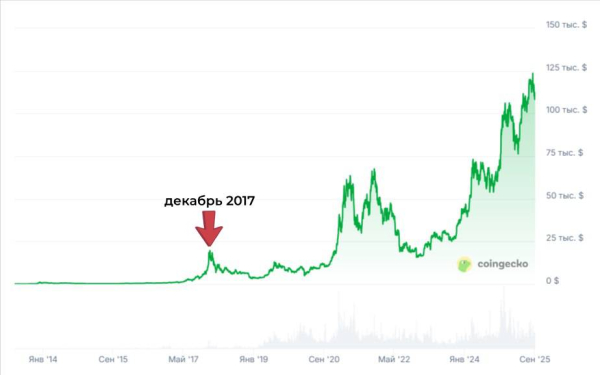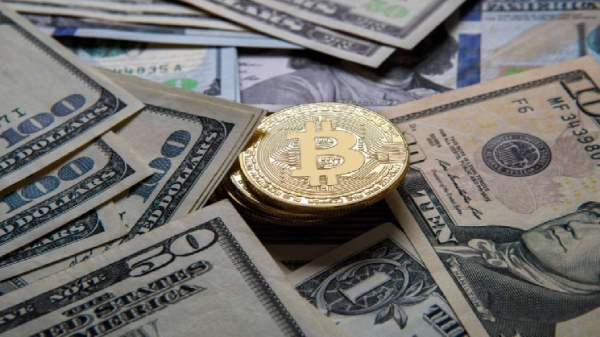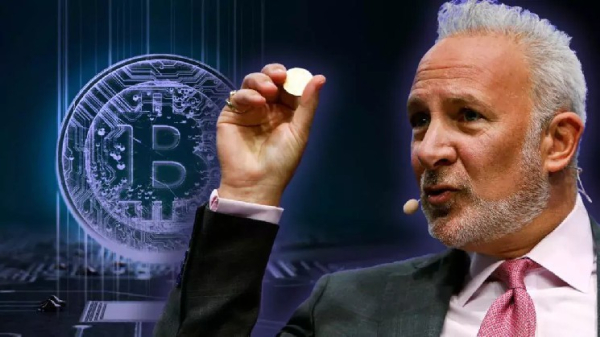Experts describe how the economy will change when the price of bitcoin reaches $1 million

Bitcoin was created as an alternative to depreciating fiat money. In August 2025, its price reached a record high of $124,128. Now market experts and analysts say that by 2030, BTC will be able to reach the $1 million mark. This will be facilitated by the growth of the US national debt, the growth of global inflation and other factors.
Such predictions are pleasing to most Bitcoiners, because then their dream of parking a luxury Lamborghini in front of their well-kept mansion will become a reality. However, this calculation is based on the current purchasing power of $1 million, but who knows what it will be in 2030.
And here it would be useful to ask ourselves and the experts several questions:
- What would be the comparative purchasing power of Bitcoin and its US dollar equivalent?
- What will happen in traditional markets – stock, real estate and gold? Can we expect a revaluation of these assets and capital outflow from these assets?
- What will be the socio-economic impact of the possible redistribution of capital, and how will the emergence of “bitcoin billionaires” affect the middle class?
The first to answer the questions was MEXC Research chief analyst Sean Young . In his opinion, if BTC really reaches the value of $1 million, this will lead to global changes in the world economy that will affect all countries to a greater or lesser extent.
Firstly, the rise in the price of bitcoin to such a level will lead to the devaluation of the dollar and the euro, to the cost of which the absolute majority of prices for goods and services are tied. The devaluation of the dollar will lead to hyperinflation: purchasing power will decrease several times, the economies of countries will begin to slowly stagnate. Naturally, $1 million in 2030, with the growth of the price of bitcoin to such levels, will not be equivalent to $1 million at the current moment. In addition, the dollar will lose its status as a world currency, which will lead to a redistribution of markets and new trade wars.
As for traditional markets, they will also change. If Bitcoin rises in price to $1 million, it will completely cease to be used as a means of payment. It will be used exclusively as an investment asset, most of which will be concentrated in the hands of large investors and funds.
Naturally, this will lead to changes in traditional markets. Gold will cease to be a safe haven asset and will completely give up this title to Bitcoin. Due to the fall in the value of the dollar, the shares of companies, especially global ones, that receive profits from operations in USD, will also fall. At the same time, the shares of investment funds and mining companies that are engaged in Bitcoin mining may grow.
As for real estate, owners of objects will prefer to receive payments from clients in BTC. By the way, such a situation can become a trigger for the development of real estate tokenization (RWA) and create a completely new market for real estate investments.
As for the social component, it will also change significantly under the influence of global economic metamorphoses. Firstly, the level of cybercrimes related to hacking wallets will increase significantly. Hackers will become more sophisticated, new viruses will be created, and social engineering will reach new levels. To solve the issue of growing cybercrime, governments will begin to introduce stricter requirements for cryptocurrency holders. In fact, a shift from decentralization to complete centralization will begin.
Countries with weak economies and high inflation, such as Argentina, Turkey and several African countries, may switch entirely to Bitcoin to protect their economies and avoid a complete default. At the same time, European countries and the United States will be forced to regulate or integrate Bitcoin into the financial system to avoid losing control over capital.
Bitcoin's rise to $1 million will create a whole new social class of young millionaires and billionaires who will be considered the main elite and will set trends in the global economy. And governments need to do more to control what is happening.

Leading analyst at Bitget Research Ryan Lee also believes that $1 million for one bitcoin in five years will not be equivalent in purchasing power to the dollar in 2025. The dollar has inflation, so goods, real estate, and services will cost more in 2030 than in 2025.
Thus, the purchasing power of a million in the future will almost certainly be lower, and it will be possible to buy a different set of goods for it.
With inflation at 3-5% per year, a million in 2030 will be equivalent to approximately $780-860 thousand in 2025 prices. Therefore, the nominal value will remain the same, but the actual value will be lower.
In mid-December 2017, Bitcoin peaked at around $19,600-$20,000 per coin. The cumulative price increase in the US from 2017 to 2025 was about 31%, so Bitcoin would have to at least rise to $27,000 to maintain the same purchasing power as its 2017 peak. However, it has risen more, making it a suitable asset for storing value and long-term investment.

Bitcoin price chart from its inception to its peak in December 2017. Source: CoinGecko
Mikael Abgaryan, Director of Business Development at EMCD, also agrees with the thesis about the inevitable loss of purchasing power by the US dollar. In his opinion, even with moderate inflation of 3-4%, it will depreciate by about 20% over five years. This means that a million dollars in 2025 will no longer be equivalent to a million dollars in 2030.
Bitcoin is different. Its emission is limited to 21 million coins, and it is impossible to “print” more. Unlike fiat currencies with an unlimited supply, Bitcoin is a digital asset that is not subject to inflation.
Hence the key conclusion: today, you can buy about ten bitcoins for a million dollars, but in a few years, given the price growth and the persistence of the deficit, the same amount will only be able to provide access to one coin. Bitcoin is becoming not just a means of saving, but a tool for protecting capital from the systemic depreciation of the dollar.
Bitcoin at a million dollars will inevitably change the market situation. Some capital will leave stocks for cryptocurrency, but there will be no collapse — markets will adapt through new instruments, including ETFs and derivatives based on BTC. Real estate will receive a powerful boost — Bitcoin millionaires will start buying up housing in prestigious locations, which will push prices up.
Gold will slow down its growth rate, retaining its status as a safe haven asset, but investors' attention will increasingly shift towards digital gold. Unlike physical gold, bitcoin can be stored in cold wallets and owned by oneself, without intermediaries in the form of funds and exchanges, which can always close and deprive the owner of access to the asset.
If the price of Bitcoin reaches a million dollars, it will radically change the socio-economic balance. The middle class will split: those who have accumulated BTC will strengthen their positions, while the rest will face the depreciation of their savings in fiat. A new elite of Bitcoin billionaires will form, who will determine the future of investments, real estate and politics. For states, this will be a challenge, as they will have to build new models of regulation and taxation in a world where the key asset is not controlled by central banks.
The millionth bitcoin will not be a price record, but a marker of the transition to a new financial era. It will change the balance between fiat and digital assets, redistribute capital and form new social strata. For those who hold BTC, this will be a confirmation of financial independence. For others, it will be a signal of the decline in the purchasing power of traditional currencies and the need to adapt to new rules.

Tehnobit CEO Alexander Peresichan shared an interesting observation on the topic of the middle class crisis already developing in the US due to inflation and expensive housing. From a socio-economic point of view, society is radicalizing: the proportion of rich and poor is growing, and the middle class is shrinking.
Bitcoin's rise to $1 million could lead to a revaluation and shift in the portfolios of retail investors who are looking to preserve and grow assets. The share of traditional assets will decrease, and Bitcoin will increase, but this is unlikely to be a major blow to traditional assets, as they will continue to receive the lion's share of investments in the foreseeable future.
True, rotation is possible on the stock market, and some investors will leave stocks for cryptocurrencies. But the BTC rate correlates with the situation on the stock market, so investors will simply diversify their portfolios, and will not completely leave stocks for cryptocurrencies. This will rather be a rotation within risky assets.
Bitcoin's rise to $1 million could also lead to the emergence of a new middle class, people who got their initial capital from the growth of the crypto market. In real estate, a local crypto bubble could emerge in countries and regions with a high concentration of BTC holders.
IT consultant on digital technologies Roman Nekrasov spoke in more detail about the socio-economic changes with the growth of Bitcoin to $1 million. In his opinion, they will be ambiguous.
On the one hand, a new class of rich and super-rich will emerge, having acquired bitcoins at the dawn of the coin's existence or during periods when it was worth significantly less than now (somewhere up to and including 2016). This situation will increase the wealth gap: the traditional middle class, which has savings in dollars, euros or real estate, will come under pressure.
On the other hand, there will be a positive effect – the young and technologically savvy will have a chance to get rich quickly, bypassing old financial institutions. As a result, classic instruments like bonds or bank deposits may lose their appeal.
Source: cryptonews.net



